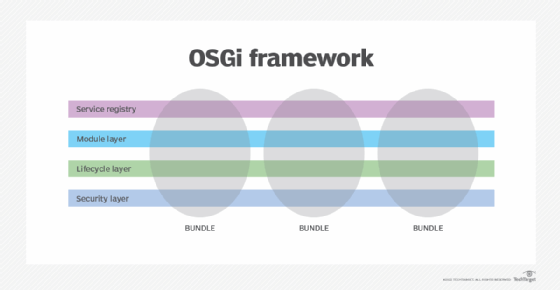OSGi (Open Service Gateway Initiative)
What is OSGi (Open Service Gateway Initiative)?
The OSGi (Open Service Gateway Initiative) specification is a Java framework for developing and deploying modular software programs and libraries. The framework was originally managed by the OSGi Alliance, an open standards organization.
In October 2020, the OSGi Alliance officially announced that its standardization working group would be transitioned to the Eclipse Foundation as a cost-saving measure and because OSGi is now working on specifications that grew beyond the alliance's original intent. It makes sense for the OSGi standards group to transition to the Eclipse Foundation, as they have a wider range of focus when it comes to open source software.
The OSGi specification consists of the following two parts:
- Standard for building modular components called bundles, or plugins. Plugins are based on component-based software engineering practices where standalone code can be written and packaged so it can be easily reused in a modular fashion. The OSGi specification defines an infrastructure for a bundle's lifecycle and determines how bundles interact and bind with other services.
- Java virtual machine-like container. These containers are used as a repository for bundles where they can be used to publish, discover and bind to services in a service-oriented architecture. This is essentially the service platform framework that bundles run on top of. These containers are flexible, enabling multiple applications to be served directly from a single container. Additionally, bundles within one container can be exposed via an application programming interface to be used by bundles in another container. The framework within which bundles reside consists of several layers that handle service registry tasks, cybersecurity, module interaction and management of the various states in the framework's lifecycle.

The original purpose of OSGi began when embedded systems vendors and networking providers came together to create a set of standards for a Java-based service framework that could be managed remotely. OSGi was originally conceived to be a service gateway for managing smart appliances and other internet-enabled devices in the home. The gateway consisted of a Java software framework embedded in a hardware platform, such as a cable modem or set-top box. The framework acted as the central message broker for the device on the home's local area network. The goal was to create a standardized middleware for smart devices and make managing cross-dependencies easier for software developers.
Since the early days of the OSGi specification, an evolution has occurred where specifications are less focused on standardizing service gateways and instead concentrate on other use cases, including uses within modern automobile applications, industrial automation, fleet and asset management, internet of things and modern mobile device applications. The popular Eclipse integrated development environment (IDE) software platform from which Java applications can be created using plugins was built directly on OSGi standards. Thus, it makes sense why the OSGi specification was absorbed by the Eclipse Foundation in early 2021.
Learn how NetBeans and Eclipse compare when it comes to implementing IDEs into an application architecture.








